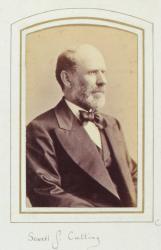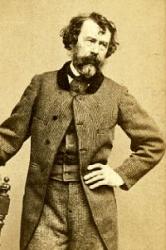
1813 - 1882 Person Name: S. S. Cutting Hymnal Number: 462 Author of "O Saviour, I am blind!" in A Selection of Spiritual Songs Cutting, Sewell Sylvester, D.D., a Baptist Minister, was born at Windsor, Vermont, Jan. 19, 1813, graduated at the University of Vermont, 1835, and was ordained at Boylston, Massachusetts, 1836. He was pastor at Southbridge, Mass., from 1837 to 1845. Editor of the New York Recorder. 1845-50, and 1853-55; and of the Christian Review, 1850-53, and 1855-68. In 1868 he was appointed Professor of Rhetoric and History at the University, Rochester, N. York, and Secretary of the American Baptist Educational Commission. He died at Brooklyn, Feb. 7, 1882. His Historical Vindication of the Baptists was published in 1858.
His hymns in common use include:—
1. Father, we bless the gentle care. The love of God. Appeared in Hymns for the Vestry and Fireside, Boston, 1841.
2. Gracious Saviour, we adore Thee. Holy Baptism. Appeared in Winchell's Additional Hymns, 1832, No. 509 (the author being then but 19); again in the Psalmist, 1843, and others.
3. Great God, Thy glories blaze. Praise to God the Father. Appeared in Linsley and Davis's Select Hymns, 1836-41, No. 514. In the Psalmist, 1843, it was altered to "God of the world, Thy glories shine." This is repeated in several collections, including the Baptist Praise Book, 1871, in 4 stanzas of 4 lines. In the Baptist Service of Song, 1871, it is given as "God of the world, near and afar," is expanded into 5 stanzas, and is dated 1835.
4. 0 Saviour, I am blind, Lead Thou my way. The True Guide. This hymn, in I. D. Sankey's Sacred Songs and Solos, is also by Dr. Cutting. [Rev. F. M. Bird, M.A.]
--John Julian, Dictionary of Hymnology (1907)
Sewall S. Cutting

